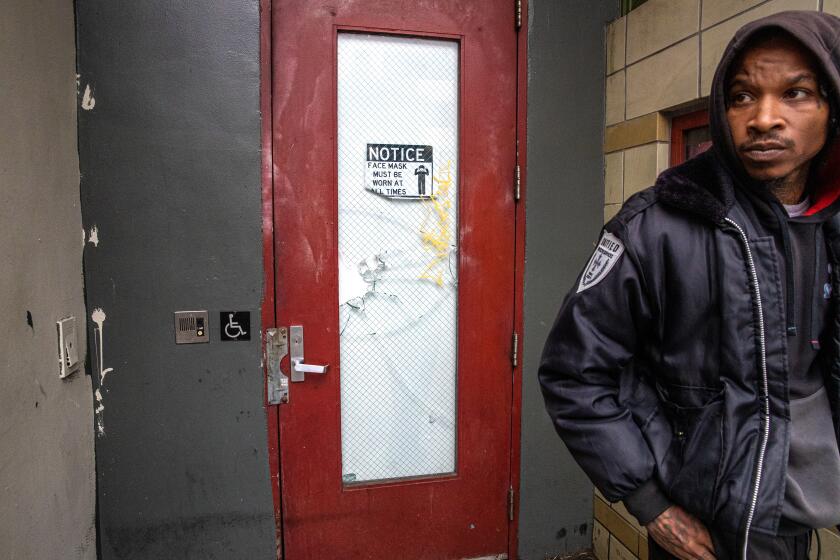L.A. attorney admits her pick for Skid Row receiver was a fail. But she doesn’t want to talk about the $8,500

- Share via
Standing in a City Hall conference room in late March, Mayor Karen Bass and City Atty. Hydee Feldstein Soto announced they’d found the best person to prevent 1,500 formerly homeless Skid Row tenants from losing their homes once again.
After years of mismanagement, the tenants’ nonprofit landlord, Skid Row Housing Trust, had financially collapsed. The pair petitioned a judge to put the trust’s 29 buildings under a receivership led by Mark Adams.
“He is the most experienced health and safety receiver we were able to locate in the state of California,” said Feldstein Soto, who spearheaded the decision, as Adams looked on behind her. “He has the breadth and depth of expertise that we think we need.”
What the city attorney did not mention was that Adams had hosted a political fundraiser for her in October, with Adams and his associates contributing at least $8,500 to her election bid, campaign finance records show.
Three months after the news conference announcing the receivership, Feldstein Soto stood before a City Council committee and admitted that she had made a mistake. She said Adams had misrepresented his ability to raise funds, shown little progress in improving conditions for tenants and failed to provide required reports on his spending.
Two weeks ago, at the city’s request, the judge asked for, and received, Adams’ resignation.
Mark Adams is overseeing the welfare of 1,500 tenants in Skid Row. In prior cases involving Adams, tenants faced the risk of eviction and property owners lost their houses.
A look into Adams’ history would have raised concerns that might have spared Feldstein Soto from her blunder.
A Times review of Adams’ prior cases published soon after his appointment uncovered multiple instances of property owners losing their homes, tenants left at risk of eviction and judges and local governments finding that Adams’ firm overbilled by six-figure amounts. Some similar problems emerged while Adams was overseeing the trust’s portfolio.
Government ethics experts noted that receivership was not a city contract so Adams’ appointment did not conflict with competitive bidding or campaign finance rules.
But they were troubled by the decision to give Adams a lucrative, open-ended, no-bid position without a formal background check, especially since he was a campaign donor.
“Did the city go to a judge and advocate for a donor or advocate for the best-qualified person?” said Jessica Levinson, a professor at Loyola Law School and former president of the city’s Ethics Commission.
Sean McMorris, transparency, ethics and accountability program manager for California Common Cause, a good government nonprofit, called Feldstein Soto’s actions “a clear dereliction of duty” that gives the appearance of pay-to-play politics.
“They should have done a modicum of due diligence even in an expedited manner,” McMorris said. “To miss all these red flags, I think is troubling. When you take that on top of the campaign contributions, the public has a right to be upset.”
In an interview with The Times, Feldstein Soto indicated that others in the city were aware of Adams’ political donations prior to her recommending Adams as receiver. She said that his contributions were irrelevant because he was widely considered the state’s most experienced receiver, and that the trust’s failure required the city to do something fast.
“We were in a position where we had to act,” Feldstein Soto said. “Call it a Hail Mary if you want. He was the only possible solution within the time frame, with the funding, with the experience that we thought could get the job done.”
But Feldstein Soto said she had concerns about Adams even before he was hired. She said that she threatened to pull the job from Adams the day before the city asked for his appointment because he had arranged for a loan at a 15% interest rate, much higher than what she said he had initially proposed.
“Do I find it deeply regrettable that the city went ahead and hired someone who misrepresented himself?” Feldstein Soto said. “Of course I do.”
Mark Adams, the receiver responsible for overseeing 1,500 tenants in Skid Row, resigned Thursday after a turbulent three-month tenure.
Adams told The Times that he was upfront about the financing terms he could secure and that it was Feldstein Soto who had failed to deliver on a promise of philanthropic funding at low interest rates.
“I wish I had done more due diligence on the city attorney’s background before I accepted this assignment,” Adams said.
The receivership already has come at a significant cost.
City officials believe the unpaid bills from Adams’ tenure could be more than $3 million, hundreds of thousands of which are owed to Adams and his firm, California Receivership Group. Two weeks ago, the City Council had to authorize a $10-million emergency loan to pay Adams’ debts and maintain the trust’s properties, with more taxpayer funding likely to be needed a few months from now. And the trust’s 1,500 tenants have faced yet another delay in improving their squalid living conditions.
Adams declined to answer questions from The Times about his campaign contributions. He has handled 300 receiverships in California over nearly 25 years and previously argued that The Times spotlighted only a handful in which judges and others had questioned his performance.
In a prior interview, Adams said that he had long wanted to do receiverships in Los Angeles, but city leaders hadn’t been interested in the idea. He approached Feldstein Soto at an event last summer, and believed her background as a bankruptcy attorney and familiarity with receiverships might make her more amenable.
“If anything, I was hoping maybe we could finally break open L.A.,” Adams said in May.
Adams gave $1,500 to Feldstein Soto in early October, the maximum allowed for an individual donor, and one of a handful of contributions he’d made in city politics over the prior decade, campaign finance records show.
Then Adams hosted a fundraiser for her, the city attorney said. On Oct. 26, less than two weeks before election day, Adams’ wife, his company’s controller and director of security, and two partners at Ervin Cohen & Jessup, the Beverly Hills-based law firm Adams frequently uses in his cases including the trust matter, donated to Feldstein Soto, campaign records show. All but one of the donations were for the $1,500 maximum and most of those contributing had rarely, if ever, given to other city candidates.
Feldstein Soto’s campaign treasurer and political consultant did not respond to follow-up questions from The Times asking for an accounting of everyone who contributed at Adams’ fundraiser.
Feldstein Soto said she already had been interested in receiverships, believing they could improve conditions for tenants in problem buildings.
After she took office, Feldstein Soto consulted with Adams about possible cases elsewhere in the city. It was only after the trust’s interim chief executive sent a letter in mid-March to city and state officials saying that the nonprofit was out of money and may have to shut down its buildings that Feldstein Soto said she conceived of a receivership for the trust portfolio and contacted Adams about it.
The compressed timeline did not allow the city to do a formal background check on Adams, Feldstein Soto said. Instead, she said, Adams’ name was floated within the city, to trust officials and to all the lenders at trust properties and no one objected to him.
“At no point in time in this process have I ever acted alone,” she said.
Manny Abascal, an attorney representing Skid Row Housing Trust, said he supported the receivership and the choice of Adams based on the city attorney’s recommendation. Abascal, who was unaware of Adams’ campaign contributions, said that the receiver had impressed him in an interview, as did a review of the firm’s prior cases from its website. He agreed with Feldstein Soto that the time crunch made deeper examination difficult.
“I really have a tough time saying, ‘You blew it. You picked Mark, you should have picked another person,’” Abascal said.
Nevertheless, there were opportunities for due diligence prior to Adams’ selection. Trust executives had gone public about their impending collapse a month before they sent their letter to the city, and had communicated the dire outlook to city officials months beforehand. Even after the city received the letter in March, it took two weeks before the city petitioned the court for the receivership.
Faced with a desperate financial situation, one of the largest owners of affordable housing on Skid Row is trying to transfer all its buildings.
Warning signs about Adams were easy to find, said Mariah Thompson, an attorney with California Rural Legal Assistance, a nonprofit that has represented tenants in at least four Adams receiverships dating back 15 years.
“This has happened so many times,” Thompson said. “For jurisdictions to continue to use this company is like willful ignorance. If they did even the most minor amount of research, or talked to even a handful of advocates for affordable housing for low-income people, we could tell them exactly what was gonna happen.”
At the March news conference, Bass said the receivership presented “a lasting solution” to the trust’s problems and pronounced the choice of Adams a “locked-armed effort” with Feldstein Soto.
But as controversy about Adams grew, Bass has not commented substantively about the receivership. The mayor did not respond to a list of questions from The Times asking why her office didn’t vet Adams and whether she was aware of his donations to the city attorney prior to his selection.
Levinson, the Loyola law professor, said that the receivership debacle provides another example of the city failing homeless residents and frustrating Angelenos who are pleading for action.
“There’s real people who are affected,” she said. “Then there are all the constituents and voters who just look at this humanitarian crisis and think, ‘Oh, this is why it’s not getting better. It’s because our elected officials are making bad decisions.’”
McMorris of Common Cause saw a need for clearer guidelines in the “gray area” of selecting receivers. Both he and Levinson credited Feldstein Soto for owning her mistake and believed the city attorney, who in other instances has decried the use of no-bid contracts, could turn the experience to her advantage.
“It’s tough to learn the hard way,” McMorris said. “But if the product is she’s much more thorough moving forward and she puts some policies in place and follows through on her rhetoric about clamping down on potential corruption ... then good on her.”
Feldstein Soto said she planned to do just that, and would solicit proposals from receivers in future matters.
In the committee hearing two weeks ago, Feldstein Soto assured council members that the city had done a more extensive vetting of Kevin Singer, the receiver the city picked to replace Adams. Singer has not donated in a city election since 2015 when he gave $500 to an unsuccessful council candidate, according to campaign finance records.
More to Read
Sign up for Essential California
The most important California stories and recommendations in your inbox every morning.
You may occasionally receive promotional content from the Los Angeles Times.











